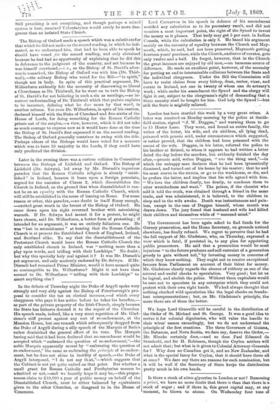The Bishop of Oxford made a speech which was a
substitute for that which he did not make on the second reading, in which he inti- mated, as we understand him, that had he been able to speak he should have voted for the second reading, and only abstained because he had had no opportunity of explaining that he did this in deference to the judgment of the country, and not because he was himself convinced,—i. e., as the Bishop of St. David's after- wards remarked, the Bishop of Oxford was with him (Dr. Thirl- wall),—the solitary Bishop who voted for the Bill—" in spirit," though not in body. In spite of this practical argument, Dr. Wilberforce evidently felt the necessity of disavowing so liberal a Churchman as Dr. Thirlwall, for he went on to twit the Bishop of St. David's for not believing in such a sin as sacrilege,—an in- correct understanding of Dr. Thirlwall which that prelate explains to be incorrect, defining what he does mean by that word, in another column. Yet even Dr. Wilberforce, in spite of his caution, declared himself with the Duke of Cleveland and five-sixths of the House of Lords, for doing something for the Roman Catholic priests out of the surplus,—a view, however, which it did not take so much courage to express now as it would have done at the time the Bishop of St. David's first expressed it on the second reading. The Bishop of Oxford generally contrives to swing with the tide. Perhaps others of the Bishops would have voted for a measure which was to have 33 majority in the Lords, if they could have only predicted the division.






























 Previous page
Previous page